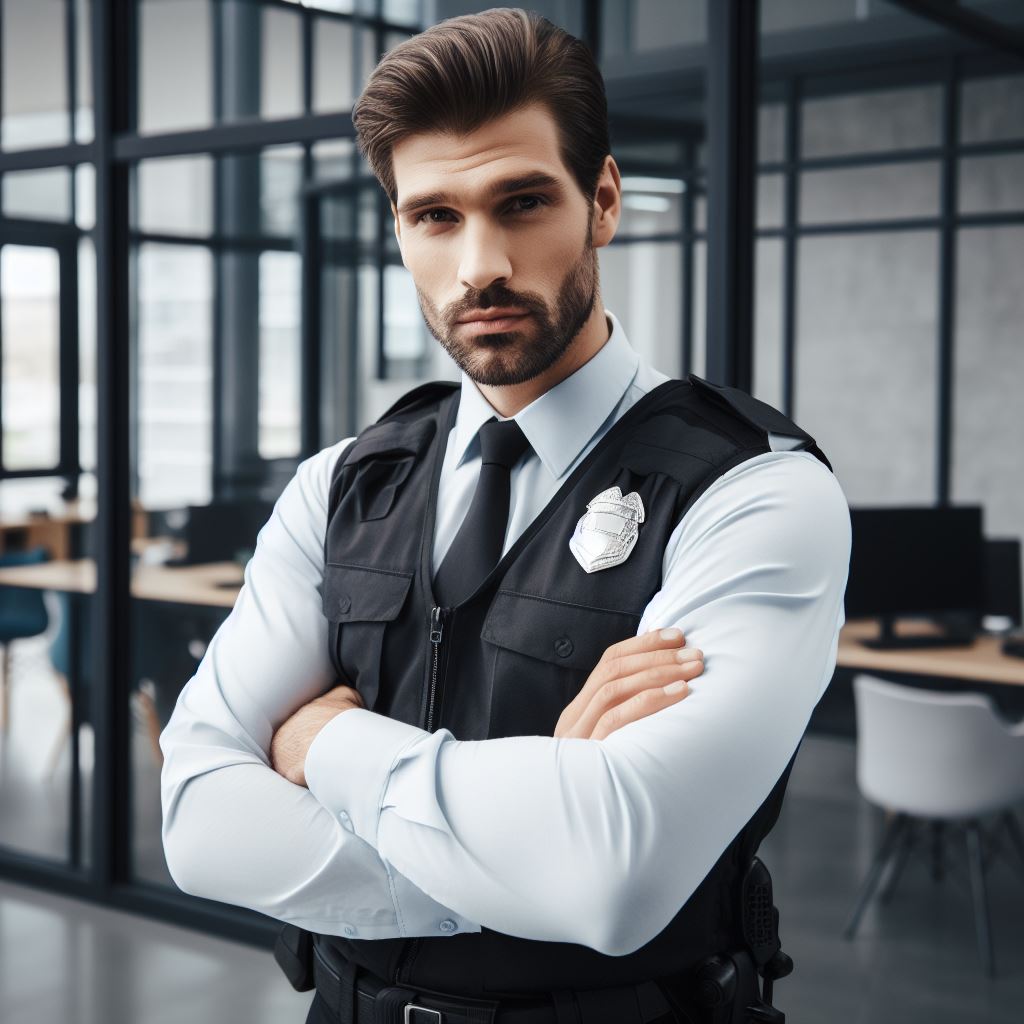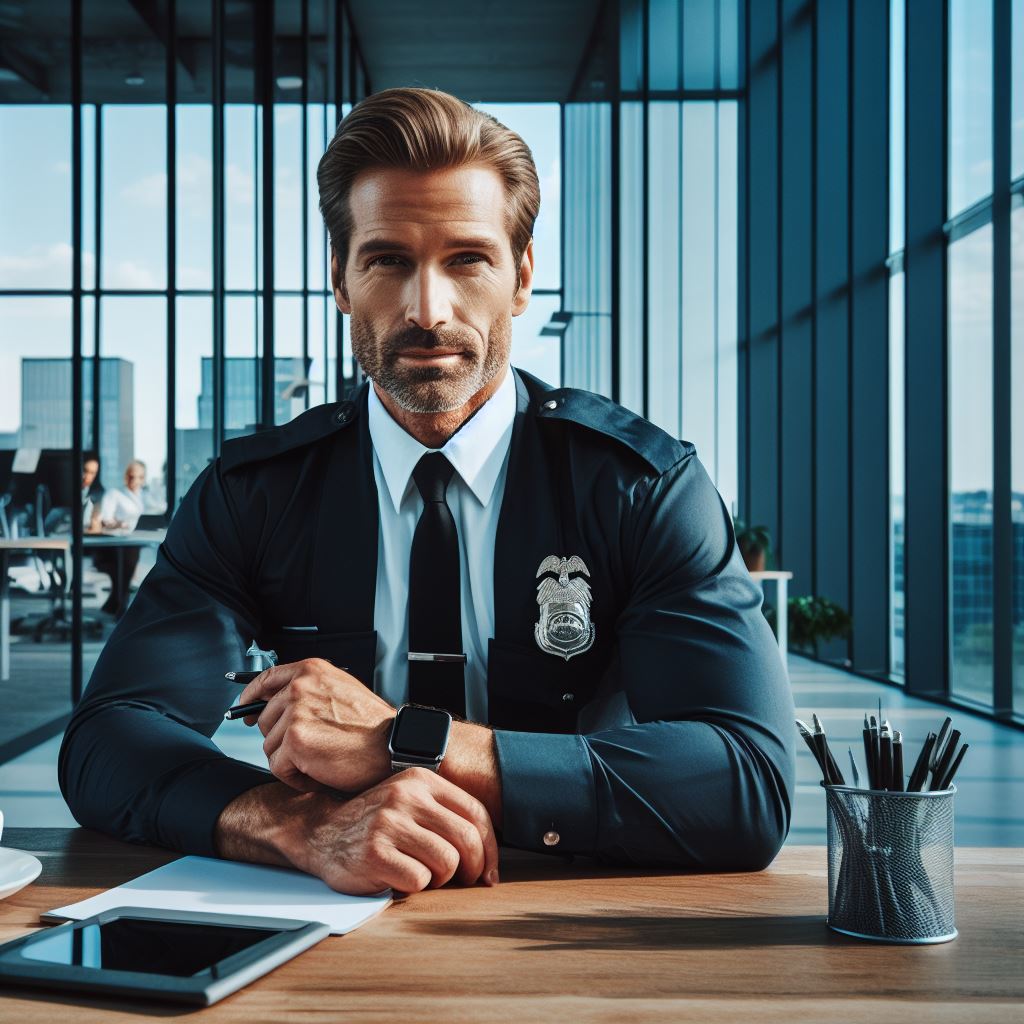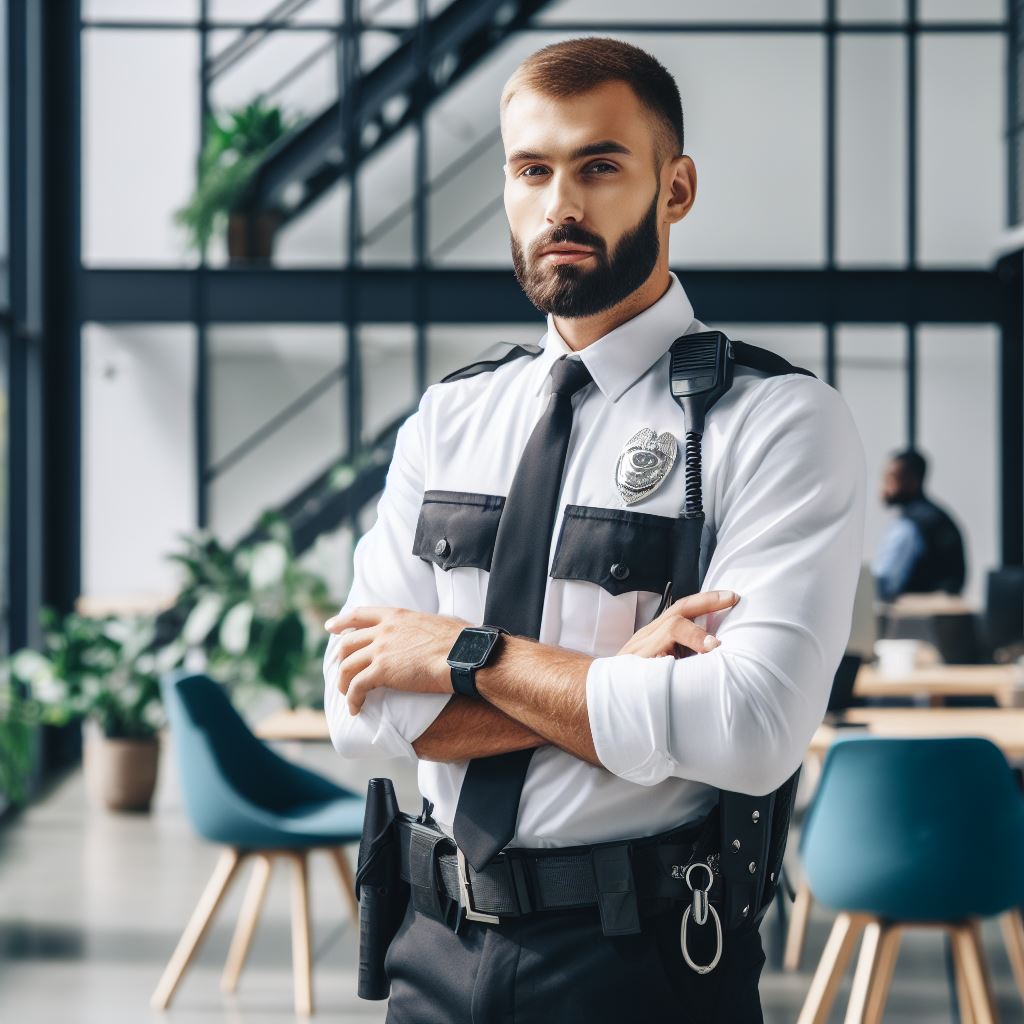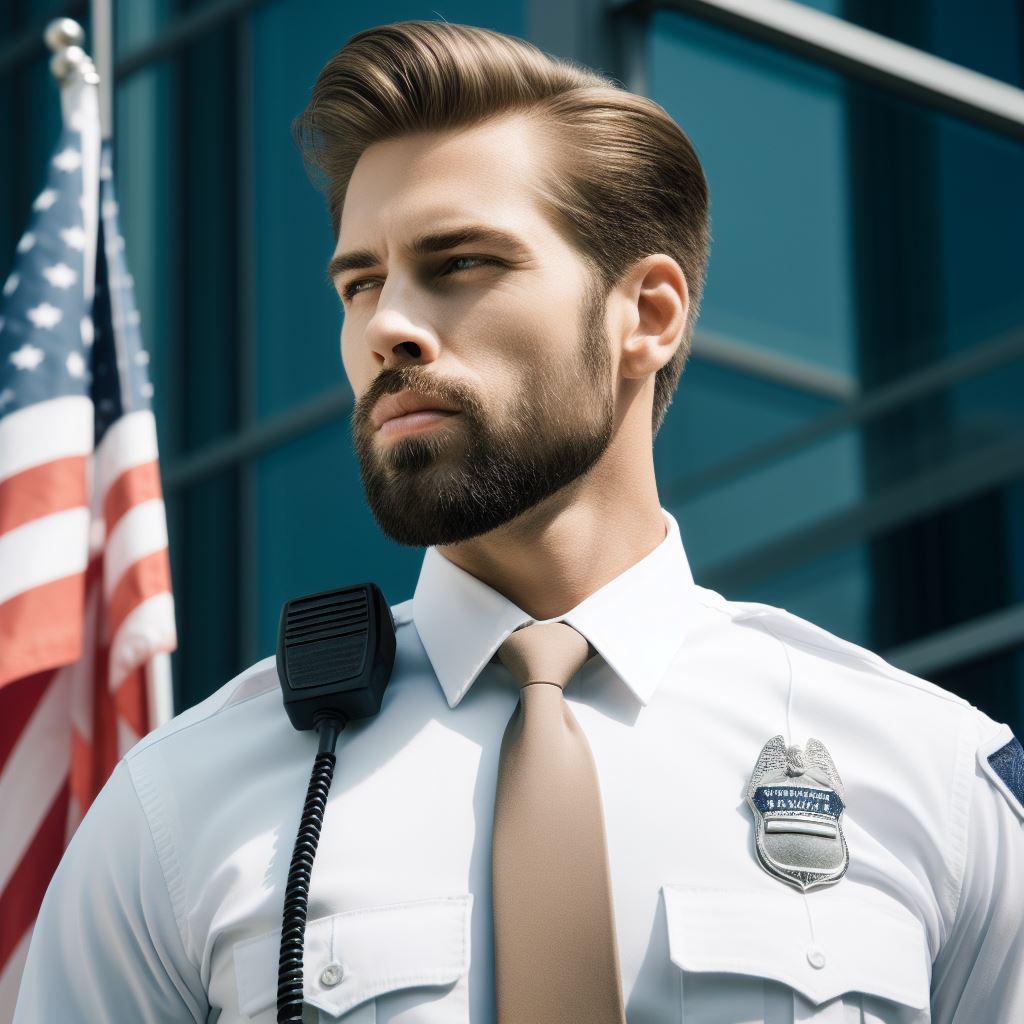Introduction
A day in the life of a U.S. security guard is filled with responsibilities that are crucial for maintaining safety and security in various industries.
From protecting people and property to preventing crime, security guards play a vital role in our society.
Importance of Security Guards in Various Industries:
Security guards are indispensable in industries such as retail, healthcare, transportation, and entertainment, where the safety of employees and customers is paramount.
They act as a deterrent to potential criminals, ensuring a secure environment for everyone involved.
Objectives of the Blog Post
This blog post aims to provide insightful details about the daily routine of U.S. security guards.
Illuminating their tasks, challenges, and responsibilities provides readers a comprehensive understanding of a security guard’s role, fostering appreciation for their societal contributions.
Through vivid descriptions and real-life scenarios, this post will offer a glimpse into the professional life of security guards, highlighting the importance of their roles, their dedication, and the risks they face daily.
Duties and Responsibilities
The primary duties and responsibilities of a U.S. security guard
- U.S. security guards have several primary duties and responsibilities that they must adhere to.
- Their main role is to maintain safety and security within their assigned area.
- Regular patrols are crucial as they help deter potential criminal activity and ensure a visible security presence.
- Monitoring surveillance systems is essential in identifying suspicious behavior and preventing security breaches.
- Incident report writing is a necessity to document any incidents or unusual occurrences during their shift.
- Security guards must also be prepared to respond to emergencies promptly and effectively.
U.S. security guards hold significant responsibilities to ensure the safety and protection of people and property. Let’s delve deeper into their daily duties and the importance of their role.
Maintaining Safety and Security
A primary duty of a U.S. security guard is to maintain safety and security within their assigned area. They act as a deterrent to criminal activity, providing peace of mind to individuals and businesses.
The presence of a security guard helps prevent potential threats and creates a sense of safety among those in the vicinity.
By patrolling regularly, they effectively monitor surroundings and identify any suspicious behavior or unauthorized individuals.
Regular Patrols and Surveillance Systems
Regular patrols are vital for security guards as they contribute to the overall safety and protection of an area.
By frequently moving through the location, guards become familiar with their surroundings and can quickly detect any anomalies.
In addition to patrols, monitoring surveillance systems plays a crucial role in maintaining security.
Security guards must stay attentive and vigilant while observing camera feeds to identify potential security breaches or suspicious activities.
Their ability to act swiftly supports preventive measures against theft, vandalism, and other criminal acts.
Incident Report Writing and Emergency Response
Incident report writing is an integral part of a security guard’s responsibilities. Whenever an incident occurs, regardless of its nature, guards must document the details accurately.
These reports serve as valuable records for future reference and investigations.
When emergencies arise, security guards must be prepared to respond promptly and efficiently.
Whether it’s a medical emergency, fire, or security breach, their immediate action can be crucial in mitigating risks and minimizing harm.
Security guards often undergo training to develop skills in emergency response, including first aid and crisis management.
Their ability to handle challenging situations professionally is essential for maintaining a safe environment.
Generally, U.S. security guards play a vital role in maintaining safety and security.
Regular patrols, monitoring surveillance systems, incident report writing, and emergency response are all essential components of their duties.
By fulfilling these responsibilities, they keep individuals and properties protected, ensuring a safer community overall.
Read: Fire Academy Training: What New Recruits Can Expect
Typical Schedule
A typical work schedule of a U.S. security guard is dynamic and can vary based on the specific job requirements and location.
However, there are certain elements that are common to most security guard schedules.
Working Various Shifts
Security guards often have to work various shifts, including nights and weekends. This is because security services need to be provided around the clock to ensure continuous protection and surveillance.
Shifts may be categorized as day, night, or overnight, and security guards may be assigned to one of these shifts based on the needs of the organization or facility they are working for.
Working different shifts can have an impact on a security guard’s personal life, as it may involve adjusting sleeping and eating patterns to accommodate their work schedule.
Importance of Adhering to the Assigned Schedule
Adhering to the assigned schedule is crucial for effective security coverage.
Security guards need to be present and alert during their designated shifts to ensure the safety and protection of the premises they are responsible for.
By strictly following the schedule, security guards can provide consistent protection without any gaps in surveillance. This ensures that any potential security breaches or incidents can be promptly identified and addressed.
Transform Your Career Today
Unlock a personalized career strategy that drives real results. Get tailored advice and a roadmap designed just for you.
Start NowAdditionally, sticking to the assigned schedule allows for proper coordination and smooth transitions between different security team members during shift changes.
Potential for Overtime and Irregular Hours
Security guard jobs often come with the potential for overtime and irregular hours. This is particularly true in situations where there is a need for increased security or during events that require extra protection.
Security guards may be required to work longer hours than originally scheduled or to be on call for emergency situations.
This flexibility is necessary to ensure that security needs are met during unexpected incidents or if there is a surge in demand for security services.
While overtime and irregular hours can provide additional income for security guards, they can also disrupt their personal lives and require adjustments to their routines.
Most importantly, the work schedule of a U.S. security guard can involve various shifts, including nights and weekends.
Adhering to the assigned schedule is essential for effective security coverage, and there is often a potential for overtime and irregular hours.
Despite the challenges, security guards play a crucial role in maintaining the safety and protection of the premises they are responsible for, ensuring peace of mind for both employers and the public.
Read: Advancements in Firefighting Gear: U.S. Innovations

Daily Tasks of a U.S. Security Guard
A day in the life of a U.S. security guard is filled with various tasks and responsibilities. From routine inspections to controlling access and maintaining documentation, here is a breakdown of what to expect.
The daily tasks that a U.S. security guard may be responsible for
- Patrolling the premises to ensure the safety and security of people and property.
- Monitoring surveillance cameras and alarm systems to detect any suspicious activities or breaches.
- Responding promptly to alarms, emergencies, and calls for assistance from individuals.
- Conducting routine inspections of the premises, including entrances, exits, and perimeters.
- Inspecting and testing security equipment, such as fire extinguishers and alarms, to ensure functionality.
- Reporting any security violations, accidents, or incidents to supervisors or law enforcement authorities.
- Assisting visitors and employees with directions, inquiries, and access control procedures.
- Controlling access to the premises by verifying identification, issuing visitor badges, and monitoring entrances.
- Patrolling parking areas to enforce parking regulations and ensure the safety of vehicles.
- Collaborating with law enforcement agencies in investigations or during emergencies.
Importance of Routine Inspections
Routine inspections of premises and equipment are essential for a U.S. security guard.
These inspections help identify and address potential vulnerabilities or safety hazards, preventing incidents from occurring.
By regularly checking entrances, exits, and perimeters, security guards can ensure that all points of access are secure and functioning properly.
Controlling Access to the Premises
One of the vital roles of a security guard is to control access to the premises.
This involves verifying identification, checking credentials, and monitoring individuals entering and exiting the facility.
By controlling access, security guards prevent unauthorized entry, maintain a secure environment, and protect the people and property within.
Maintaining Incident Logs and Documentation
Keeping accurate incident logs and documentation is crucial for a security guard. Any security violations, accidents, or incidents that occur during a shift should be documented in detail.
These records help in investigations, provide a historical reference, and can be used as evidence in legal proceedings.
Thorough and accurate documentation is essential for maintaining accountability and ensuring a high level of security.
In essence, a U.S. security guard’s daily tasks encompass a wide range of responsibilities, from conducting inspections and controlling access to maintaining incident logs and documentation.
By diligently performing these tasks, security guards play a crucial role in maintaining a safe and secure environment for individuals and protecting valuable assets.
Read: Mental Health and Firefighters: Addressing PTSD Risks
Learn More: Building Bridges: Police Outreach & Youth Programs
Learn More: Diversity in US Police Forces: Where Are We Now?
Challenges and Rewards
Being a security guard in the United States comes with its fair share of challenges. From long hours to potentially dangerous situations, these guards face adversity every day.
Acknowledge the challenges faced by U.S. security guards in their daily work
- Working long shifts that can extend into the late hours of the night.
- Dealing with confrontational individuals who may pose a threat to the safety of others.
- Maintaining constant vigilance to prevent theft, vandalism, and unauthorized access.
- Overcoming the monotony of repetitive tasks, such as patrolling and monitoring surveillance cameras.
- Adapting to various weather conditions, ensuring safety even in extreme heat, cold, or rain.
The importance of remaining calm and composed in potentially stressful situations
One of the most crucial qualities for a security guard is the ability to stay calm in high-pressure scenarios. When faced with tense situations, they must keep a cool head and think rationally.
By remaining composed, security guards can effectively diffuse conflicts and handle emergencies with precision.
Their ability to assess the situation and make quick decisions is essential for maintaining a safe environment.
The rewards of helping ensure safety and providing peace of mind to others
Despite the challenges, there are numerous rewards associated with being a security guard. The sense of fulfillment that comes from keeping others safe is unparalleled.
Knowing that their presence deters criminal activity and provides peace of mind to clients and the general public is incredibly rewarding. Security guards play a vital role in creating safer communities.
The potential for career growth and advancement in the security field
Security guards often start at entry-level positions, but the field offers significant opportunities for advancement and career growth.
Transform Your Career Today
Unlock a personalized career strategy that drives real results. Get tailored advice and a roadmap designed just for you.
Start NowWith the right qualifications and experience, security guards can progress to supervisory roles or specialize in specific areas such as cybersecurity or executive protection.
The demand for skilled security professionals is constantly increasing, providing a promising outlook for career advancement.
All in all, being a security guard in the United States presents both challenges and rewards.
It requires remaining calm in stressful situations while acknowledging the potential dangers faced daily.
However, the opportunity to ensure safety, provide peace of mind, and advance in the field make it a fulfilling career choice.
Read: Key Skills Every U.S. Firefighter Must Possess
Conclusion
In summary, working as a security guard in the United States requires dedication, alertness, and the ability to handle various situations effectively.
Security guards play a pivotal role in maintaining safety and security in different establishments.
Throughout the blog post, we discussed the daily tasks and responsibilities of a U.S. security guard.
From patrolling premises and monitoring surveillance systems to responding to emergencies and conducting security checks, security guards are always on the frontline, ensuring the protection of lives and property.
The importance of security guards cannot be overstated.
They provide a visible deterrent to potential criminals, actively preventing thefts, vandalism, and other criminal acts.
By being present and vigilant, security guards create a safe environment for employees, customers, and the general public.
It is crucial to appreciate the efforts of U.S. security guards in their daily work. Their dedication and commitment to maintaining safety and security deserve recognition.
Next time you encounter a security guard, take a moment to thank them for their service and express appreciation for their hard work.
To Summarize ensuring our safety and peace of mind in a world filled with potential threats and risks.




